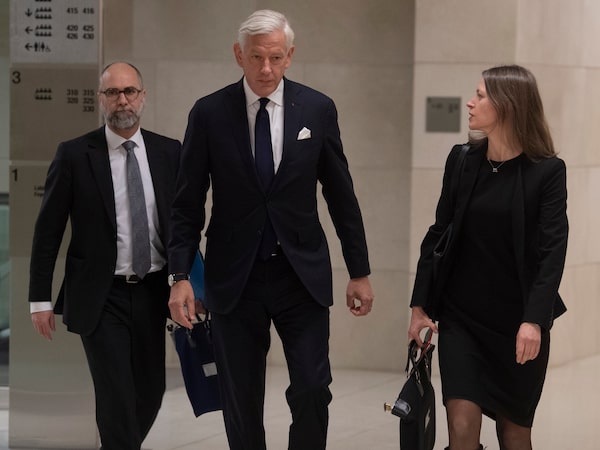
Canada's Ambassador to China Dominic Barton makes his way to a committee room to appear before the House of Commons committee on Canada-China relations in Ottawa on Feb. 5, 2020.Adrian Wyld/The Canadian Press
Canada’s ambassador to China has returned home for strategic consultations on how the federal government should deal with Beijing’s increasingly aggressive foreign policy including trials of two imprisoned Canadians.
Dominic Barton has been recalled for high-level talks as Canada joined the United States, Britain and the European Union on Monday in imposing sanctions on Chinese officials overseeing Beijing’s brutal treatment of Muslim minorities, including the Uyghurs.
It is the first time Canada has imposed sanctions on China since the 1989 Tiananmen Square massacre of pro-democracy protesters by Chinese troops. The sanctions freeze any assets held by Canadian financial institutions, which have a significant presence in China, and forbid banks from providing financial services to those named.
The co-ordinated measures, a Biden administration strategy embraced by Prime Minister Justin Trudeau, are a show of international unity to condemn what the U.S. government and Canada’s Parliament have labelled state-sanctioned genocide in China’s northwest Xinjiang region.
Two senior Canadian officials said Mr. Barton, who is currently under post-travel quarantine in Toronto, was brought home from Beijing for important strategic meetings concerning “sensitive issues” with China; they declined to discuss further details. Mr. Barton’s recall also allows for greater ease in conducting secure private conversations that are more difficult in Beijing where China’s spy agencies monitor diplomats.
Canada-China relations have been eroding since 2018 when Michael Kovrig and Michael Spavor were locked up by Beijing in apparent retaliation for Canada’s arrest of Huawei executive Meng Wanzhou on behalf of the United States. Mr. Trudeau has said the two Canadians are the victims of “trumped up” charges. Secret trials for the two men were held on Friday and Monday.
The federal government brought Mr. Barton back for consultations. He arrived within the past few days. Mr. Barton’s return to Canada was arranged before Ottawa learned that China had set trial dates for the two men, according to the government officials. The Globe and Mail is not identifying the officials because they were not authorized to publicly discuss the matter.
China expert Charles Burton, a former diplomat and senior fellow at the Macdonald-Laurier Institute, said the timing of Mr. Barton’s return is puzzling because he will have to be quarantined for 14 days in Canada and 14 days when he goes back to Beijing.
“The timing is very unfortunate. Leaving the embassy in the hands of a chargé d’affaires limits the access that Canada has to senior levels of the Chinese leadership and I think it is possible that this could have been the reason why we failed to get the most basic consular access to Michael Spavor in Dandong and Michael Kovrig in Beijing,” he said. “Considering how tense relations are between China and Canada, I am surprised we would have our ambassador away from the post for such a long period of time.”

Protesters hold signs at a New York rally in support of the Muslim Uyghur population in China's Xinjiang region on March 22, 2021.TIMOTHY A. CLARY/AFP/Getty Images
Gordon Houlden, a former diplomat who is now director emeritus of the China Institute at the University of Alberta, speculates that Ottawa is pondering some changes in foreign policy toward Beijing. At the same time, he said, Canada has to gauge what approach the Biden White House, only in power for 60 days now, will take with Beijing.
“We have a new U.S. administration which hasn’t yet revealed its cards in terms of its China policy,” he said.
“I suspect that a range of issues in terms of policy changes are being examined going forward because the government knows that things have deteriorated steadily over the last two years and there is no clear sign forward ... we’re in a zone of uncertainty.”
Canada-China trade is growing after a pandemic lull but there is no high level dialogue between Canada and China today, Prof. Houlden said.
One of the two senior Canadian officials said Ottawa is trying to come up with a clear articulation of a China policy that is aligned across government departments and is focused on co-ordinated co-operation with the United States and other allies, such as the Uyghur sanctions.
The official said the strong display of support of diplomats from 23 countries, including the U.S., EU and Britain, at the trial of Mr. Kovrig in Beijing on Monday is an example of how Canada is attempting to build alliances to confront China.
The official described the evolving Canada-China policy as putting chess pieces on the table, pointing to the recent statement signed by 58 countries that criticized China’s use of arbitrary detention as well as the Prime Minister’s decision to allow a free vote in Parliament that unanimously declared genocide is taking place against China’s Uyghurs. Mr. Trudeau and his cabinet members abstained in the vote.
Wenran Jiang, a retired political science professor from the University of Alberta, predicted China will retaliate against Canada for imposing sanctions. He said Beijing has already hit back at the EU over its Uyghur-related sanctions.
“Beijing made it clear that any countries that sanction China will receive a forceful counteraction, as in the case in the latest EU round. So Canada can expect the same,” Mr. Jiang said, adding the Uyghur sanctions will reinforce “Chinese perception that the West is weaponizing the human-rights issues” to try to contain China’s rise.
The two Canadian officials said the purpose of the China rethink is to take a hard look at Beijing’s global behaviour, but the No. 1 objective is to secure the release of the two Michaels.
The Chinese government officials targeted by Canada’s sanctions include Zhu Hailun, the former head of the country’s Xijiang region and the man often described as the architect of the mass internment camps, as well as Wang Junzheng, secretary of the party committee of the Xinjiang Production and Construction Corps, a quasi-military organization accused of using forced labour. Also hit were Wang Mingshan, former director of the Xinjiang Public Security Bureau, the provincial police in region, as well as Chen Mingguo, current director of this same entity.
The Trudeau government is counting on Joe Biden’s proposed reset of U.S.-China relations to open the door for the release of the two Canadians. After a virtual meeting with Mr. Trudeau last month, the President vowed to work for the safe return of the two Michaels, saying “human beings are not bargaining chips.”
Canadian officials told The Globe last week there is strong possibility that the U.S. Justice Department could negotiate a deferred prosecution agreement with Huawei that would allow Ms. Meng to return home while the Chinese telecom would pay a hefty fine. Any agreement would require an admission of wrongdoing. The U.S. federal court in the Eastern District of New York would have to approve the agreement.
The government is also actively considering the creation of a registry of foreign agents similar to the ones in Australia and the United States. The registry would include former politicians and public servants who take on paid roles foreign governments and companies linked to those states.
Know what is happening in the halls of power with the day’s top political headlines and commentary as selected by Globe editors (subscribers only). Sign up today.
 Robert Fife
Robert Fife Steven Chase
Steven Chase Nathan VanderKlippe
Nathan VanderKlippe